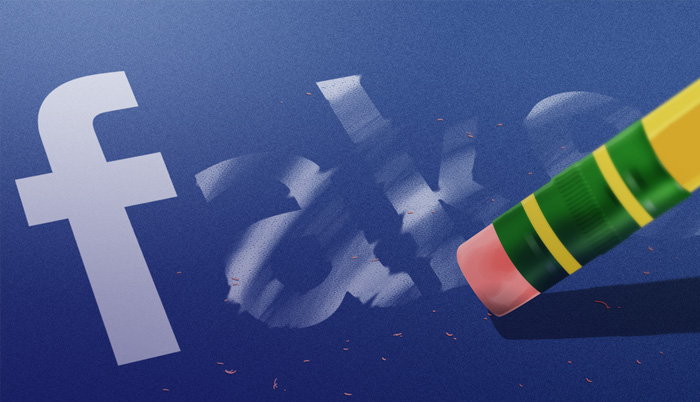![]() Home > Internet & Media
Home > Internet & Media
Facebook And Google Join Forces To Wage War Against Fake News

IMAGE: BOB AL-GREENE/MASHABLE
![]() February 7th, 2017 | 09:56 AM |
February 7th, 2017 | 09:56 AM | ![]() 1223 views
1223 views
Mashable.com
"Fake news" is the crisis du jour for online media in 2017, and now, two tech giants are working together to stop it from wrecking a pivotal election.
...Well, another pivotal election.
Facebook and Google, along with newsrooms in France (including France 24, the partner for Mashable's French-language edition), are joining forces on a new project that will help verify or debunk viral information online. It's called CrossCheck, and it'll focus on the 2017 French presidential election. The initiative, billed as "a collaborative journalism project," was originally conceived by First Draft, a nonprofit focused on verifying information in the digital age, and Google News Lab.
The French election fits nicely as a sort of "round two" for Google and Facebook, which failed to stem the rise of misinformation supporting Donald Trump before his election last November. France is at an inflection point, with an incredibly unpopular sitting president and an ascendant candidate, Marine Le Pen, who could overthrow the incumbent with her far-right, France-first platform.
And speaking of "fake news," Le Pen has already benefited from an organized effort to discredit her opponents with fabricated online profiles, BuzzFeed reported last month. Pepe the frog, a stoner comic book character that became an unlikely icon for white nationalism in the U.S. last year, has leaped over the Atlantic to support her, as well.
So CrossCheck has its work cut out for it. But details about how the project will work are a bit sketchy. It sounds as though Google and Facebook will provide access to tools like CrowdTangle and Google Trends to help experts track how topics are being discussed on social media.
According to a report in Le Monde, Facebook will also roll out a French version of a news-reporting tool that allows users to flag bogus content on the social network. Third-party fact-checkers will assess the content and a warning will be added to "disputed" links.
Disputed content may also be ranked lower in a user's News Feed, per a Facebook update from the end of last month.
"It is this element that decided it for us," said Jérôme Fenoglio, director of Le Monde, as translated from French by Mashable. "For the first time, it would be possible to act [using] an algorithm when content poses an editorial problem."
"Fake news" is the bleating scapegoat that's come to define this era of American politics. Originally intended as a label for fabricated stories written with maximum virality in mind—often in support of President Trump—the term's been co-opted by some authority figures to confuse the public into thinking that actual facts are falsehoods.
President Trump has tweeted about "fake news"—often, in screaming capital letters— at least 16 times since December. But unlike the material CrossCheck's concerned with, his "fake news" is typically-factual material that makes him look bad, and that he's got a vested interest in turning the public against.
For example, President Trump tweeted early Monday morning that "any negative polls are fake news," which really requires no unpacking. It's been retweeted over 22,000 times.
Still, cutting down on how misinformation spreads on Facebook is a worthy pursuit. A recent survey from the Pew Research Center indicated that social media does indeed have the power to change what people believe—an idea that shouldn't be ignored as yet another Western power prepares to decide its future.
Source:
courtesy of MASHABLE
by DAMON BERES
If you have any stories or news that you would like to share with the global online community, please feel free to share it with us by contacting us directly at [email protected]